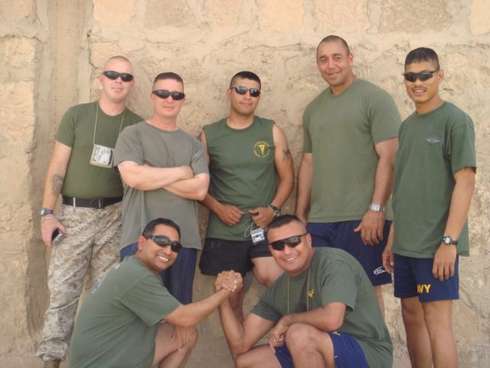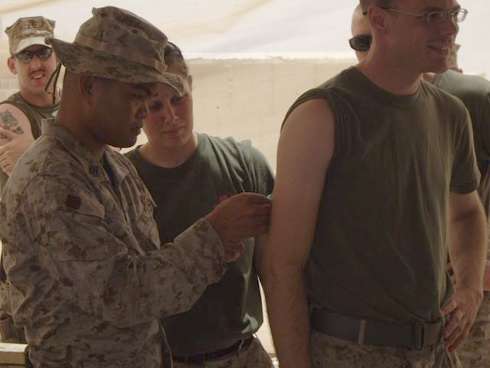05 Aug 2007:
Aaah! It’s been a while since I’ve written anything and for that I apologize. Lots of changes around here for me! I have been permanently assigned to a forward operating base (FOB) which has been quite a change. While my job description hasn’t changed, my duties have changed considerably. FOBs are generally very remote and self-sustaining locations. The personnel out here use a lot of Iraqi infrastructure, sewer, water, etc. My job is to evaluate potential health hazards and figure out ways to reduce or eliminate them. The biggest problem seems to be standing water and sewage which can lead to a host of health problems. Flies and mosquitos are in abundance and are the biggest immediate concern as they commonly transmit disease. Aside from my Preventive Medicine duties, the Battallion Aid Station (BAS) here is part of the chain through which combat casualties are channeled. This means that I get to deal with a lot more trauma medicine than at my previous location. Very rewarding at times but also very difficult. Well that’s about all for now. Thank you again for all of your support. I apologize if I haven’t gotten thank you notes to some of you lately. Time is at a premium here but rest assured, you are greatly appreciated by all the sailors, marines, and soldiers you are supporting. Thank you!
HM1 (FMF) Randahl S Benson
15 Jun 2007

I'm the guy second from the right in back.

I have enclosed a picture of myself and some of the members of our unit and on of our shot exercises. We've been keeping busy with our day to day sickcall duties, convoy coverages and recently some of our female Corpsmen have been doing some humanitarian work in one of the towns near our base. It has been well received and they typically see between 150 and 200 women and children in a day.
Your words of support and packages are a great morale booster to our unit and the other units we work with. Thanks again.
Below is the text of a letter that I have sent to some of our supporters to give them a little better understanding of what we do.
*My name is Randahl Benson. I am a Hospitalman First Class in the U.S. Navy. I am writing to thank you for the recent letters and packages that you have sent me and my fellow servicemen. Anything and everything is much appreciated and has been or will be put to good use. I apologize for not responding as quickly as I would have liked, but I am sure you understand. I know this not too personal and I will try to send individual notes as well but I wanted to let you know that the items have been received.
You may be wondering what the Navy does in the desert, so I’ll give you a quick rundown of what we do. Hospital Corpsman or “Doc”, as we are affectionately referred to by our Marines, are the largest rating or job specialty in the Navy. We serve in many locations from hospitals and clinics in the States and Overseas to the field with Marines and Navy Seabees. Hospital Corpsmen are highly trained and while often compared to Army medics, our training is much more rigorous and broad in scope.
From boot camp, most of us go through 16 weeks of training which covers anatomy to first aid to basic nursing skills. Those of us who serve with Marines (Marines do not have a medical MOS), then receive 8 weeks of field training where we learn to do what Marines do. We learn additional combat medical skills as well as how to handle and operate weapons, radios, and other Marine Corps equipment. Corpsman serving with Marines do everything Marines do and then while the Marines take a break our work begins. We run around patching them up, administering medications, and providing whatever medical care they need. When we’re done, it’s usually time to move again, thus our breaks are not really breaks at all. In the field, all of this medical care is done without the supervision of a doctor. This is why we get the name “Doc”.
Hospital Corpsmen are the most highly decorated specialty in the Navy and have served along side Marines in every major battle since the Hospital Corps was established. A Navy Corpsman was a member of the group who raised the American Flag on Mount Suribachi that is so famously depicted.
The Hospital Corps is further divided into several specialties. We have lab techs, x-ray techs, or techs and so on. My specialty is preventive medicine. While I still have the basic responsibilities as a Corpsman, I am also responsible for camp sanitation, immunizations, food and water sanitation, as well as numerous other tasks that fall under the broad heading “preventive medicine”. The name speaks for itself. Anything that can prevent illness, injury or disease is my responsibility.
A little about me. I joined the Navy in 1994 from Saint Louis, MO where I was living at the time. After my boot camp and formal schooling, my first duty station was with the Seabees or (Naval Construction Battallion). From there I went on to work at a Navy medical clinic on the same base. After that, I was transferred to a Marine unit in Yuma, AZ and finally to the medical clinic in Yuma. I am currently serving with a (MAW) Marine Air Wing in Iraq. So for me, Iraq isn’t that much different from where I came from, hot and sandy.
Again, I would like to thank you on behalf of myself and the Marines and Sailors I serve with.
HM1 (FMF) Randahl Benson
01 May 2007
Hello. I am currently on an airbase here in Iraq. However, due to my job as a Preventive Medicine Tech, I get out to many of the FOBs (Forward Operating Bases) on a regular basis. As many of the FOBs I go to are in very remote areas, mail and other amenities are sporadic at best. It is my intent to distribute items to these areas on each of my visits. Useful items include snacks, razors, baby wipes, bodywash, books, cds, dvds, socks, underwear, etc. Thank you for your support.



